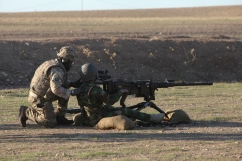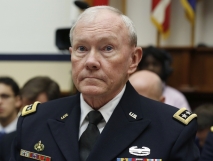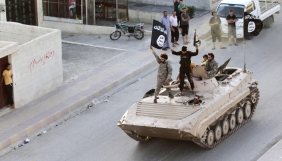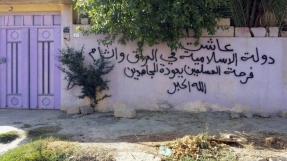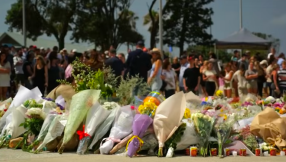"This is not a question of religion and religious excess; this is the radical depravity of man to which...the redemptive power of God is the only answer," a top Tory MP said last night.
Speaking before a group gathered in Parliament, the Minister of State for International Development, Desmond Swayne, spoke at length on the problem of the Islamic State – a term which he refused to use.
"To humour Daesh by calling it Islamic State" is to accept that the terrorist organisation is following Islamic principles; "a standing insult to a billion peace-loving Muslims around the world," Swayne said.
Instead we should refer to the group as 'Daesh', "because they hate it," he added.
Lamenting that the Christian population in the Middle East has now halved, and that the Assyrian Church in particular – "the only Church that speaks Aramaic, as our Lord did" – is facing complete extinction, Swayne laid out the harrowing reality for those living in the region.
"With respect to Iraq, currently we estimate that there are some 2 million internally displaced people, about half of that – 1.2 million – in desperate need of...assistance through the winter," he said.
The situation in Syria is "significantly worse," he added, noting that this will be the fourth Christmas that Syrian Christians will be celebrating amid turmoil.
"We estimate that 12.2 million people are in need of humanitarian assistance, 7.6 million are displaced, and some 3.2 million are refugees elsewhere in the region," Swayne said.
"These are truly desperate situations [in which] people are living, and we're doing what we can to bring assistance to them."
Military action is required, he said.
"I don't believe for one moment that Daesh can be defeated from the air, but I do think it can be degraded, and air contribution is an important one. It has to be beaten by boots on the ground, but I don't believe that they should be our boots," Swayne added.
Having served for six months in the Iraq war in 2003, Swayne said "One of the lessons we've learned it that actually our boots might make things rather worse rather than better, so we have to recruit other boots to do that." He later clarified that these must be "Iraqi boots".
However, Swayne also said that there is "nothing ISIL can come up with that Christians have not matched" throughout history. He highlighted the crusades and the practice of burning witches as examples of ways in which Christianity has been used to justify "bloodthirsty" acts, insisting that we cannot blame Islam for the behaviour of extremist groups.
This received an impassioned response from his audience, particularly the leader of the Christian People's Alliance, Sid Cordle, who listed several verses from the Qur'an inciting violence and highlighted the disparity between these commands and those given by Jesus.
"I do not regard the enormities that are described in Christian history as representative of Christianity at all," Swayne responded.
"I believe them as being representative of the radical depravity of man expressed in all religions, and that's why I believe that the only answer is the redemptive power of God."
Another issue discussed was whether the UK government might offer aid to refugees on the basis of their religion, given that Christians, Yazidis and Sunni Muslims are among those most vulnerable to ISIS.
"We must be absolutely even-handed, we do not ask anyone's religion when we deliver relief...need is the only criteria," Swayne said.
However, Zoe Smith, head of advocacy at Open Doors, said: "It's undeniable that public religious affiliation does add to people's vulnerabilities," and argued that it is therefore imperative that religion is taken into account when addressing need.
"I am not persuaded, I think that that would make things worse," Swayne responded.
"If we were to deliver aid on the basis of confession, then that would make the mix worse. Of course, if a particular group in a particular area, irrespective of their religion, is in desperate need then we will do everything we can to address that, but we won't ask them what creed they say, or what prayer they say at night."
However, he did underline the importance of engaging people of faith in the process of reconciliation. "We are putting in a great deal of funding to train and empower religious leaders to work for a peaceful solution, out of which hopefully a political solution will come," he said.










